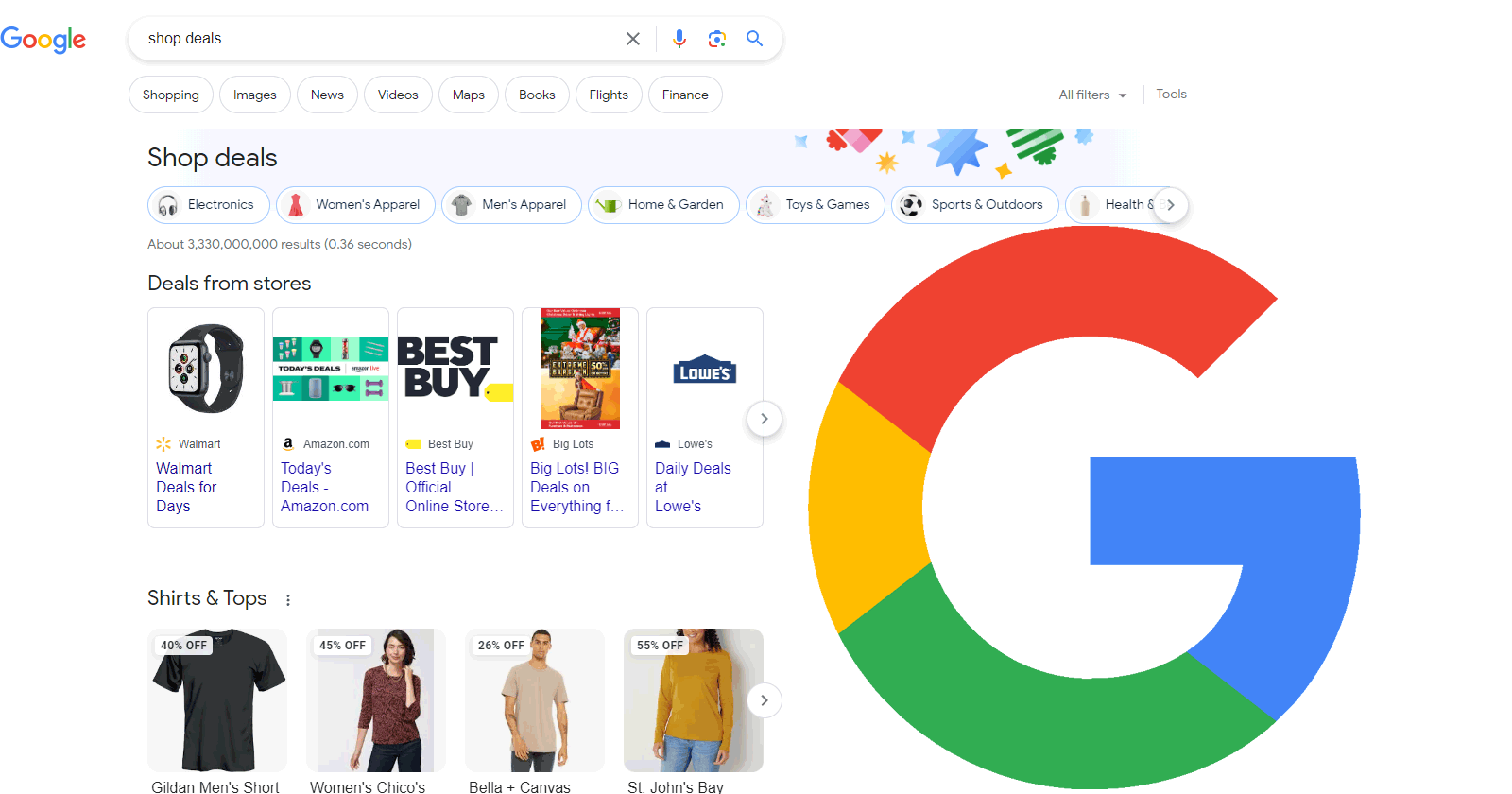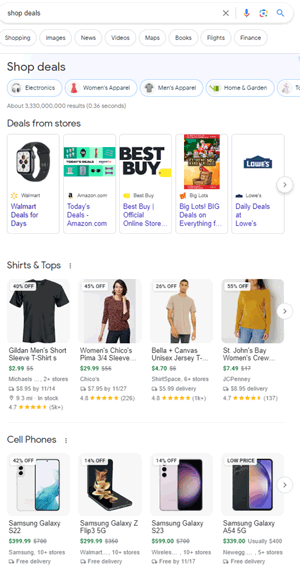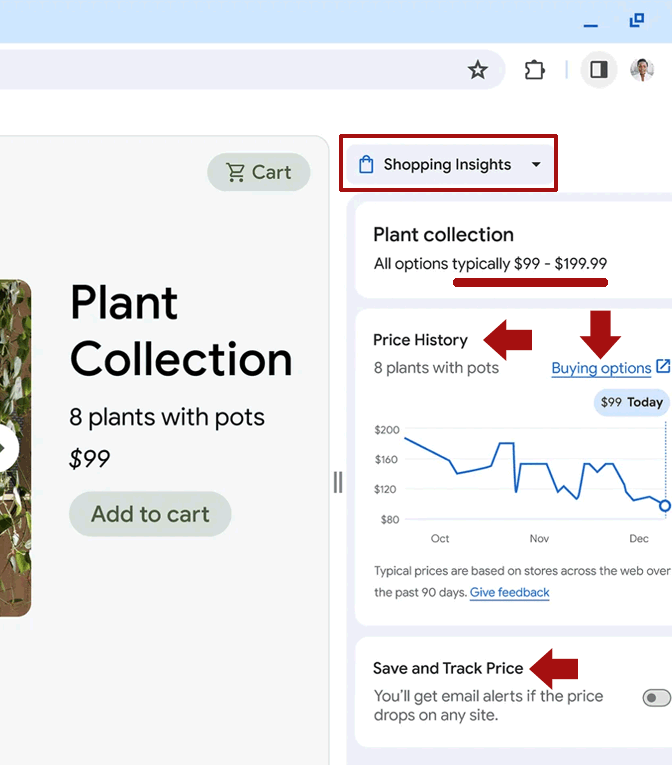New Google Search Feature Is A Shopping Portal via @sejournal, @martinibuster
Google adds a shopping portal to search and a new Shopping Insights panel to Chrome Desktop so users can find deals anywhere The post New Google Search Feature Is A Shopping Portal appeared first on Search Engine Journal.

Google announced a new search feature for shopping deals that is powered by Google’s Shopping Graph, a dataset of the entire world’s shopping information plus numerous updates to Chrome that makes it more shopping oriented.
Portals were big in the late 1990s, with AOL being the most obvious example, but they went out of fashion not long after Google introduced their simple search box without the clutter typical of web portals of the time.
Screenshot of Google’s New Deals Page

Google doesn’t call it a shopping portal but if a web portal is a webpage that aggregates shopping information from across the Internet and makes it accessible to users in an easily navigable manner, then Google’s new search feature qualifies as a shopping portal.
Also announced are changes to Chrome for mobile and desktop that transforms them into a more shopping oriented web browser.
Chief among the new features are a new way for users to bookmark products to a shopping list folder, ability to track prices and get what Google calls “price insights” (which is a new feature for the desktop version of Chrome).
Google says that eight out of ten shoppers are concerned about getting the best deal on holiday gifts.
The intent of these new features is to provide users with twice as many deals on all the products they are looking for.
Among the new features Google is introducing are:
Search enhancements powered by the Google Shopping Graph New deals page on available on Google Search New features on Chrome for discovering discounts across the web New Price Insights tab in desktop version of Chrome Additional ways to track prices from all merchants for the same productsNew Google Search Deals Destination
The new search feature for shopping is available by searching for Shop Deals, which takes consumers to a new search destination for shopping deals (that looks like a portal).
Users can now go to the new Shop Deals destination page to find the lowest prices on products found in ten categories.
The deals are in the form of markdowns, sales and promotions.
The ten product categories in the carousel are:
Electronics Women’s Apparel Men’s Apparel Home & Garden Toys & Games Sports & Outdoors Health & Beauty Travel & Luggage Baby & Kids Pet SuppliesThe Shop Deals page organizes the shopping data in the following order:
Navigational menu to ten shopping categories Carousel of deals offered by specific stores Listing of specific deals organized in rows by more granular shopping categories.An example of the list of granular shopping deal categories:
Shirts & Tops Cell Phones Toys Pants Kitchen Appliances Handbags TVs Skin CareUsers can click a link labeled More categories to find more shopping categories.
According to Google:
“You can scroll through carousels of deals by category, which take into account what you usually like to shop for when you’re signed into Google, and see popular stores that have deals on what you’re looking for.
See a product you’re interested in? Click into the product or visit the merchant site to learn more.”
New Shopping Features On Chrome Mobile & Desktop
Opening a new tab can show deals on products consumers shopped for in the “resume browsing” card.
There is also a new “Discount tag icon” that’s located in the Chrome address bar that shows coupon codes available at shopping sites that Chrome users are visiting.
Where the shopping coupon codes appear on search can be managed by merchants through their Merchant Center settings.
Shopping Insights Feature
Also announced is that the Chrome Shopping Insights feature is coming to Chrome Desktop.
Chrome will show a “Shopping insights” label in the Chrome address bar that when clicked opens a side panel with a new section that shows typical prices, a graph with a price history from the past 90 days and a button for tracking for price drops on any ecommerce store that offers the same product.
Google’s announcement explains:
“It’s a common dilemma: You’ve found the perfect gift, but there’s a nagging question in the back of your mind: Will the price drop after I buy? More than a quarter of people say they procrastinate holiday gift-giving because the gift may be available at a lower price later.6
To help settle this predicament, today we’re bringing our price insights features, already available on Search, to Chrome on desktop.
When these insights are available on a shopping site, you’ll see a “Shopping insights” label in the Chrome address bar. Click on it to open a new section in the Chrome side panel that will show that product’s typical price range and a price history graph for up to the last 90 days.”
Screenshot of Chrome Shopping Insights Tab
 Screenshot by author from a Google image
Screenshot by author from a Google image
Google’s Price Insights support page explains this feature:
“On the shopping product page, you can find the price insights for that product.
It shows if a product’s price is low, typical, or high, and how its price changed in recent months.
Our assessment of a product’s typical price is based on info from sellers across the web, not just from options available on Google Shopping.”
Shopping Bell For Discount Notifications
Lastly, mobile Chrome gets a shopping bell icon next to a product name that sends price alerts if the price of the product drops on any retailers site, not just the retailer the user is browsing on the web.
Takeaway
Google’s mission is to organize the world’s information and make it universally accessible and useful.
That mission to organize information makes sense in the context of eight out of ten consumers are concerned about the price of holiday gifts.
It’s possible merchants may not like Google referring their shoppers to other retailers.
But that may mean it’s ever more important to build a positive relationship and trust with consumers so that they prefer to shop with one merchant they trust.

 MikeTyes
MikeTyes 
































